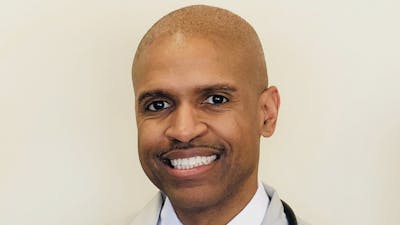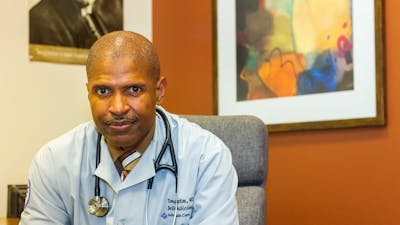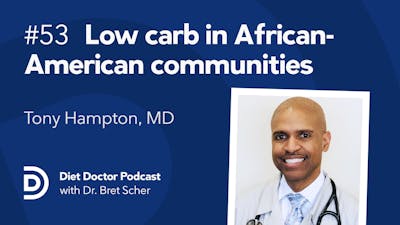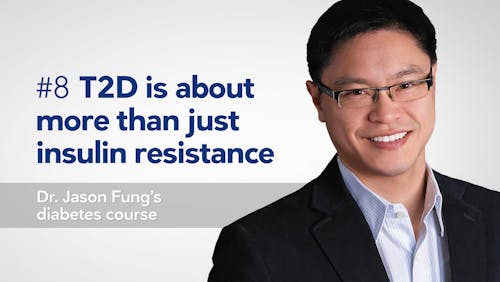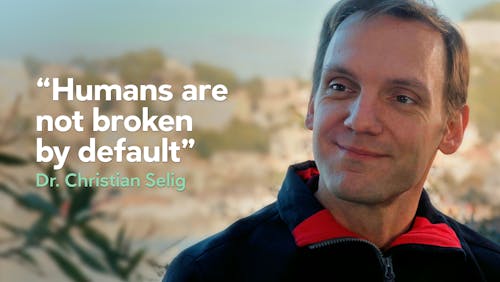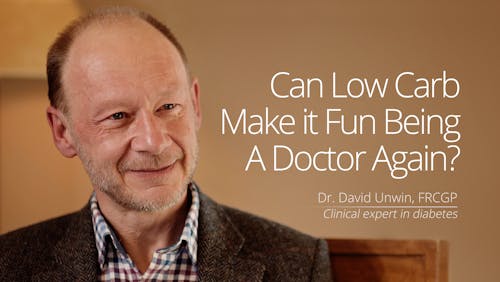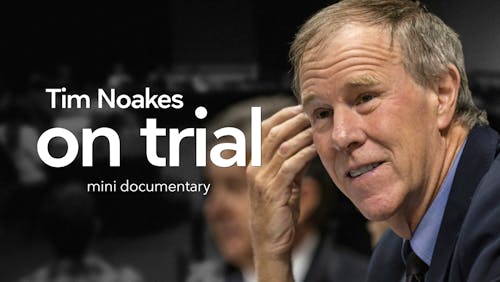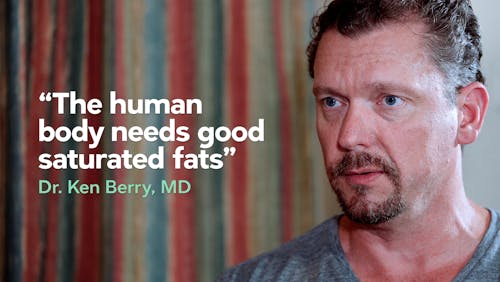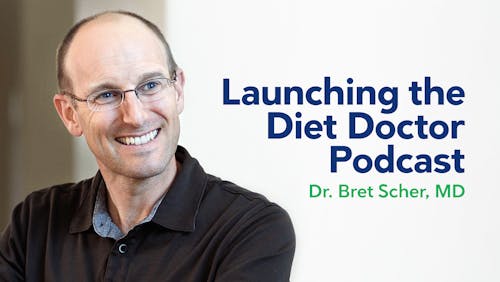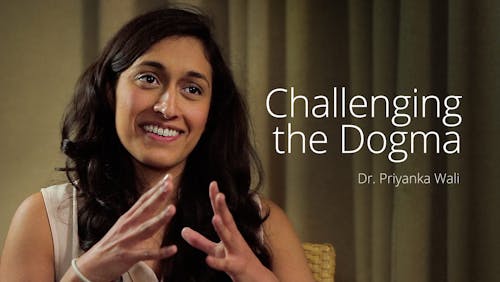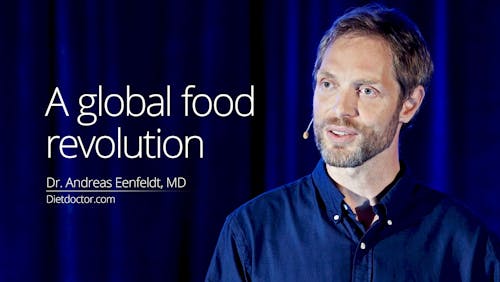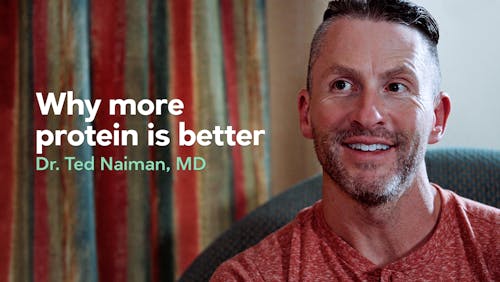Dr. Hampton: Honoring those who help our journey
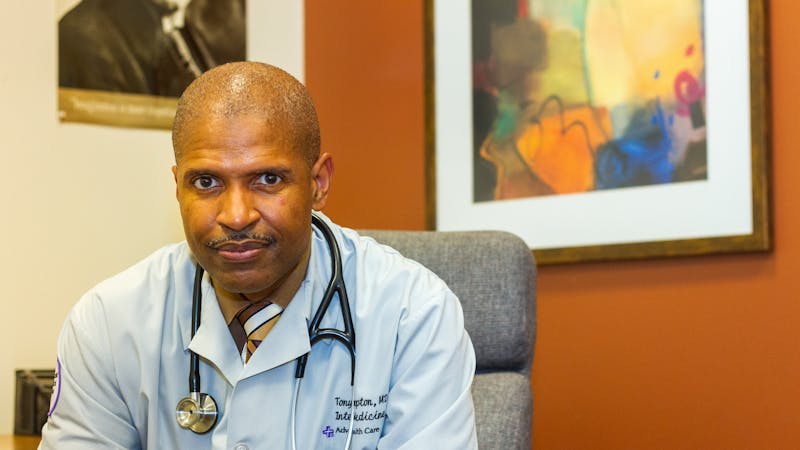
Photo: Spencer Bibbs
Dr. Tony Hampton is a family physician on the South Side of Chicago. He is writing a monthly column for Diet Doctor. This is his ninth column.
I’ve been thinking about the importance of such people in our lives — especially as we aim to get healthier. We all need these sort of supportive, influential relationships to learn, grow, and succeed.
I want to take this column to tell you about a few of these supports in my life, as it relates to being a low-carb physician who always wants to learn and grow. I have been inspired and fundamentally changed by key people or organizations in the low-carb world.
Caring, competent, and conventional
When I look back on my 23-year career as a family physician, before I found out about low-carb and keto eating for diabetes, I was a caring, conscientious, and competent doctor.
I followed the conventional medical guidelines and practiced medicine the way I was taught. I managed my patients’ conditions and I served my patients well.
But I wasn’t helping them with diet and lifestyle choices that could reverse their chronic diseases, especially type 2 diabetes and metabolic issues. In fact, I didn’t even know that reversing chronic diseases was possible.
Then, in October 2011, everything changed. My wife (Karon) developed type 1 diabetes. Since she’s a pharmacist, it was more devastating because she fully understood the impact this diagnosis would have on her life.
She literally knew that she would be a pincushion from that day forward. She felt afraid, depressed, angry, and had a sense of loss.
I especially remember her talking about all the favorite foods that felt she would not be able to eat anymore. It was like a life sentence without a chance for parole. She could only focus on what she had to cut from her diet as opposed to what she could have.
This led me to search for ways to help her lower her blood sugar without relying solely on drugs and for her to still eat some of the foods she loved. That’s when I found the low-carb world. I discovered various low-carb experts, sharing their anecdotal stories on Twitter and YouTube — and of course, many delicious ways to prepare low-carb-friendly foods.
As a clinician, I was energized and inspired to learn this powerful new way of healing. I experimented with low carb with myself, my family, and then ultimately, with my patients.I became a better doctor. I wrote a book (Fix Your Diet, Fix Your Diabetes); I began blogging and tweeting; I coined my catchphrase “Protect your N.E.S.T., which stands for nutrition, exercise, sleep/stress, thoughts/trauma, and started my Protecting Your NEST podcast .
Community, connection, and consensus
When we work alone, we are isolated. At first, I felt like I was standing on an island by myself. But in my heart, I felt that I could help more people and make a bigger difference if I worked as a team with others.
Along with my N.E.S.T. acronym, I also equip patients with a R.O.P.E. acronym, which stands for relationships, organisms, pollutants, and emotions. (I will discuss these ROPE points in future columns.)
My wife noted that a rope is not just a good acronym, it’s also a good metaphor to think about all the people who inspire us. We are all pulling together — as if pulling a rope against the challenges of conventional thinking. We are linked with a common mission to improve patients’ health through their diet and lifestyle.Being exposed to a community of doctors and researchers who, like me, believe in reversing metabolic disease in this way has accelerated my learning and my scope. Together, we are building a wider consensus that will see more clinicians recommend low-carb diets to patients.
We share research papers and gather at annual conferences to discuss and exchange evidence-based information, tools, and resources. We inspire each other. We extend our reach wider than our own small communities of patients. We help find like-minded colleagues for patients around the world.
Low-carb community shout-outs
I could name many people who have inspired and influenced me along the way, including the almost 60 people I have now interviewed for my podcast.
But I want to give a shout-out to a few key people and organizations. If you don’t know them, check them out.
- Pam Devine and Doug Reynolds, LowCarbUSA : Devine and Reynolds are the co-founders of LowCarbUSA, which they started in 2015. They provide continuing medical education and dietary education, host regular scientific conferences, provide online coaching, and maintain a comprehensive library of scientific papers.
Their annual LowCarbUSA conference in San Diego is coming up August 26 to 29 and is a highlight on the calendar. (I am a presenter this year, so I hope to see you there. Use the code NEST to get a special discount on both the online and in-person conference.)One of Low Carb USA’s important activities, coordinated by Diet Doctor’s dietitian Adele Hite, PhD, was the creation of clinical practice guidelines for therapeutic carbohydrate reduction. That is a key document that makes practicing low-carb clinicians feel less isolated and alone.
- The Society of Metabolic Practitioners: This organization was also founded by Reynolds and its board of directors includes low-carb figures, such as Dr. Eric Westman, Dr. Mark Cucuzzella, Dr. Robert Cwyse, and Dr. Tro Kalayjian.
This society represents all researchers and practitioners working to improve metabolic health around the world through education, training, and support of evidence-based nutritional approaches.
- Diet Doctor: How could I not mention the wonderful Diet Doctor? It provides me this platform to share my columns, enabling me as an African American physician to reach so much farther than my community in the South Side of Chicago.
But more than that, it provides up-to-date evidence-based information, recipes, information, and support to my patients and to people everywhere. I know that I am sending my patients to a trustworthy resource.
Dr. Andreas Eenfeldt is another hero of mine, as is medical director Dr. Bret Scher. I am so honored to now be part of the Diet Doctor team.
- Metabolic Multiplier: Imagine being new to the low-carb community, and unexpectedly someone, whose vision aligns with yours, just magically appears. That’s what happened when Metabolic Multiplier Founder Cecile Seth reached out to me in 2020 and asked, “Is there anything I can do to help support the work you are doing?”
Her grassroots, volunteer-powered organization was created to support clinicians, like myself, who believe in helping others achieve metabolic health. The organization “curates” evidence-based links and spreads the word about research to the many clinicians and patients who may benefit.For example, she’s helped me find guests for my podcast and also has listed me among Black leaders, working to advance culturally relevant metabolic health.
- Charles Mattocks: This is a name you may not know — yet! But Mattocks is an emerging force for low-carb eating, especially for type 2 diabetes among the African American community.
He’s an actor, chef, author, documentary filmmaker, dad, and more. (Fun fact: He’s also the nephew of reggae singer Bob Marley!) You can listen to his story in episode #55 of my Protecting Your NEST podcast. In it, Mattocks shares how his own type 2 diabetes diagnosis led him to explore low-carb eating and lifestyle change.
In fall 2021, Mattocks’ new docuseries, Reversed, will be broadcast on television and streaming services. It follows five people with type 2 diabetes and shows how their health improves and diabetes is put into remission through low-carb eating.
It is sure to be a game-changer, particularly among people of color who often don’t hear the message of low-carb eating or see themselves represented in these stories.
These are just a few of the important people who have helped me grow and learn, and who help pull on the rope to provide more medical consensus and support. These are very important professional relationships for me — and my work as a doctor.
In my next column, I will start talking about the “R” (aka, the relationships aspect) of my R.O.P.E. acronym. Specifically, I’ll focus on the close, personal relationships we have with partners, family, and friends. These relationships can support us — or unfortunately even sabotage us — as we work to get healthier.
In the meantime, think of your more professional community connections and relationships. Do you have people and organizations around you that inspire and sustain you?
Until next time, remember to protect your N.E.S.T.!
